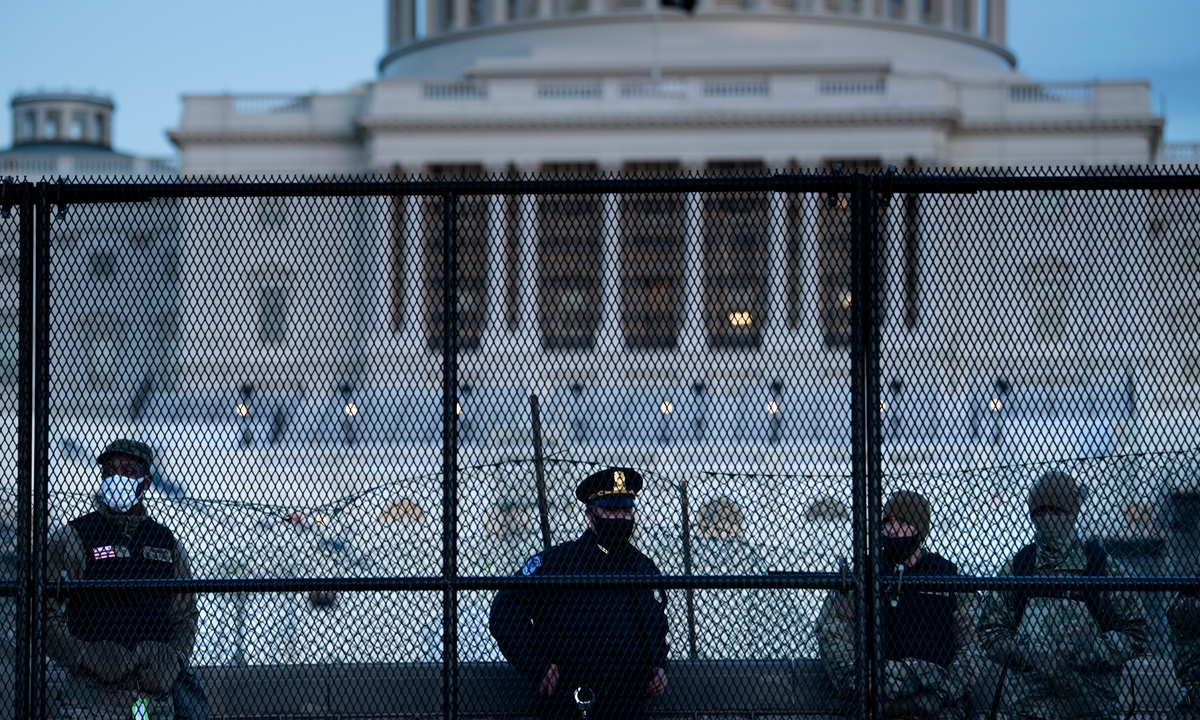US turns democracy into ‘strategic weapon’ to counter opponents

A Capitol police officer stands with members of the National Guard behind a crowd control fence surrounding Capitol Hill a day after a pro-Trump mob broke into the US Capitol on Thursday in Washington, DC. Photo: AFP
According to US media, US President Joe Biden will host a "Summit for Democracy" during his first year in office. The summit aims to mobilize so-called democratic governments to form a wide alliance to contain the rise of so-called authoritarian countries such as China and Russia.It is unknown what countries will be invited. India will probably be included. If India is not invited, its self-proclaimed moniker as "the world's largest democracy" will remain in name only. But if India attends, the American standard for democracy will surely degrade.
Whether a country is democratic or not is not only dependent on the form of its government. If the governance lags behind, social development is stagnant, chaos constantly occurs and people's living standards cannot be improved, then such a democratic system is meaningless.
With such measurement, the US is not qualified. The various farces staged before and after the presidential elections last year have been stains on democracy - even in the eyes of some Western scholars.
Austrian political scientist Ivan Krastev recently wrote an article for the New York Times entitled "Biden Can't Decide What Counts as a 'Democracy.'" He believes, "The world's liberal democracies have lost their monopoly to define what democracy is, not simply because the new authoritarians claim democratic credentials (they have won free if not always fair elections), but also because a vast majority of Americans and French are deeply disappointed with their own political system."
Some American politicians and scholars seem to be proud of the storming of the Capitol Hill in January, as they believe it shows the tenacity of American democracy. But will they tout the same if it happens in another country?
It is up to the Americans to feel and judge the resilience of their democracy. But given what has happened in the US, other countries will question the White House's qualification of pointing an accusing finger at their domestic affairs in the name of democracy.
For a long time, the democratic values sold by the Americans have disturbed world people's perception of democracy. This is where some of the global trouble originate.
Many people think that as long as democracy is implemented in accordance with Western standards, a country will become orderly and can develop its economy quickly. Its people can thus live a happy life as those in Western countries. Elites in some developing countries also once believed such a democratic form of government could bring about rule of law, order and development.
Western democracy, indeed, contributes to the growth of the West. But this doesn't mean that the sense of happiness in others countries will automatically grow as long as they make a copy. It is impossible to plant the exact same tree of democracy in a different soil of cultural and historical traditions as in the West. This can be proven by the development of countless developing countries.
If a state cannot establish a democratic government based on its nation's own cultural and historical traditions, it is impossible to create a long-lasting system of governance that is conducive to stable development.
Many developing countries adopted the form of democracy after World War II. However, at the very beginning, many of them did not focus on or were unable to find a development model suitable for their national conditions. Moreover, later, they were unable to implement effective governance due to institutional and cultural traditions, as well as ethnic problems. As a result, these countries were plunged into intermittent or continuous turmoil and chaos.
One of the reasons why democracy has failed in these countries is that their democratic systems are "transplanted" rather than "naturally grow" there. This can be seen in India, for instance.
Another reason for the failure is that the US and some Western countries define what democracy is based on their global interests. They even impose their version of democracy on other countries.
Washington has even turned democracy into a "strategic weapon" to unite so-called democratic countries against its strategic opponents or enemies. This has seriously interfered with developing countries' pursuit of building democratic institutions consistent with their development paths. It has even undermined the democratic process in these countries.
Therefore, we need to think about two questions. How can we help small and medium-sized countries develop their own democratic systems according to their cultural traditions? How can we create and provide more space for their exploration? These are also major challenges that global development is facing now.
The author is a senior editor with People's Daily, and currently a senior fellow with the Chongyang Institute for Financial Studies at Renmin University of China. dinggang@globaltimes.com.cn. Follow him on Twitter @dinggangchina




